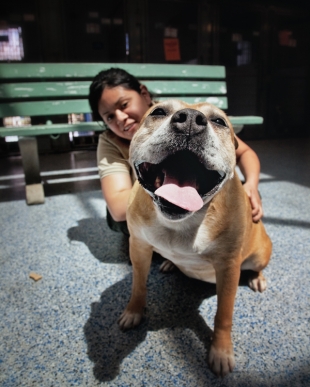 In just about every article we’ve written, we’ve referred people to Long Beach Animal Care Services’ (ACS) Web site to answer any questions they may have regarding pet care, urban wildlife, specific domestic animal concerns—stuff about almost any species that moves around by leg, wing, fin or belly. ACS has recently redesigned its Web site to make it more interactive, user friendly and attractive, and Long Beach residents now have even more information access for keeping their pets and their neighborhoods safe and for taking responsibility for their animal companions—and if anyone’s looking to add one to their family, there’s a highlighted section on shelter adoption.
In just about every article we’ve written, we’ve referred people to Long Beach Animal Care Services’ (ACS) Web site to answer any questions they may have regarding pet care, urban wildlife, specific domestic animal concerns—stuff about almost any species that moves around by leg, wing, fin or belly. ACS has recently redesigned its Web site to make it more interactive, user friendly and attractive, and Long Beach residents now have even more information access for keeping their pets and their neighborhoods safe and for taking responsibility for their animal companions—and if anyone’s looking to add one to their family, there’s a highlighted section on shelter adoption.
“The website overhaul is one part of the strategy for making the City of Long Beach the safest large city in California for people and animals,” wrote the center’s manager, John Keisler, in a press release.
The new site includes more than 50 of the most frequently asked questions and more than 100 pages of content about responsible pet ownership and local animal laws. The latest features include two drop-down menus, one addressing concerns and the other listing specific services; photo-enhanced highlights that will soon be made interactive; location and hours, including mandated furloughs; an options menu for specific topics; and special announcements. Of special interest are the Petfinder service for online location of lost pets, online dog license applications, and did we mention adoption? The site’s Web address remains the same.
The site also features tips about urban wildlife, including reporting and mapping of wildlife activity.
“Animal Care Services is the only city agency in the state that currently maps coyote sightings for residents to engage neighborhoods in preventative measures such as removing food, water and shelter for wildlife,” Keisler stated.
Keisler added that there are still some kinks to work out regarding browser issues and layer interference, but the site’s up and navigable.
The site encourages community participation and makes it easier to do with print-ready community flyers about wildlife reporting, pet defecation and other topics. They’re located on the left-hand menu, on the Volunteers page.
“One of the most important components of public safety and the humane treatment of animals is an engaged community,” said Ronald R. Arias, Health and Human Services Department Head, “and people need good, timely information to prevent issues from becoming problems.”
Community engagement is necessary for any effort to succeed, and not only in troubled economic times. Visit ACS’s Web site—if you don’t have a question or a need, we’re sure you’ll discover one, especially on the adoption page.
“Adopt some love today.” – Patrick McDonnell (Mutts Comics), Shelter Stories
Residents are still encouraged to call 9-1-1 in the event of an animal emergency. For regular business or calls for service, please contact Animal Care Services by phone (562) 570-PETS (7387) or email animalcare@longbeach.gov. The P.D. Pitchford Companion Animal Village, 7700 East Spring St., is open to the public Wednesday through Friday, from 10:00 am to 5:30 pm, and Saturday and Sunday from 10:00 am to 4:00 pm. The Village is closed on Monday, Tuesday and holidays. After-hours emergency phone calls for Animal Care Services are automatically transferred to the Fire Department for dispatch service.
SB 250: Show Support for Responsibility
Part of the reason that we have shelter overcrowding is the fact that people don’t spay or neuter their pets and let them run loose. We don’t like the idea of legislating responsibility either, but visit any shelter or feral colony and you’ll see the need.
According to Judie Mancuso, Social Compassion in Legislation’s tireless president, opponents of the bill are saying that the issue will result in no more guide dogs, pet show raids—in short, weird stuff that can be compared with other weird stuff that’s being said about another high-profile issue. This law isn’t a death panel for responsible breeding—it doesn’t target helper-dog or other licensed breeders; it’s a tool to eliminate overcrowding and expense of euthanasia at shelters as well as the horror of puppy mills. Mancuso’s made it easy; visit her Web site for a list of assembly members to call and information on SB 250.
And tell your friends to spay and neuter their pets. Companion animals are not an endangered species. However, the individuals in the shelters are.

